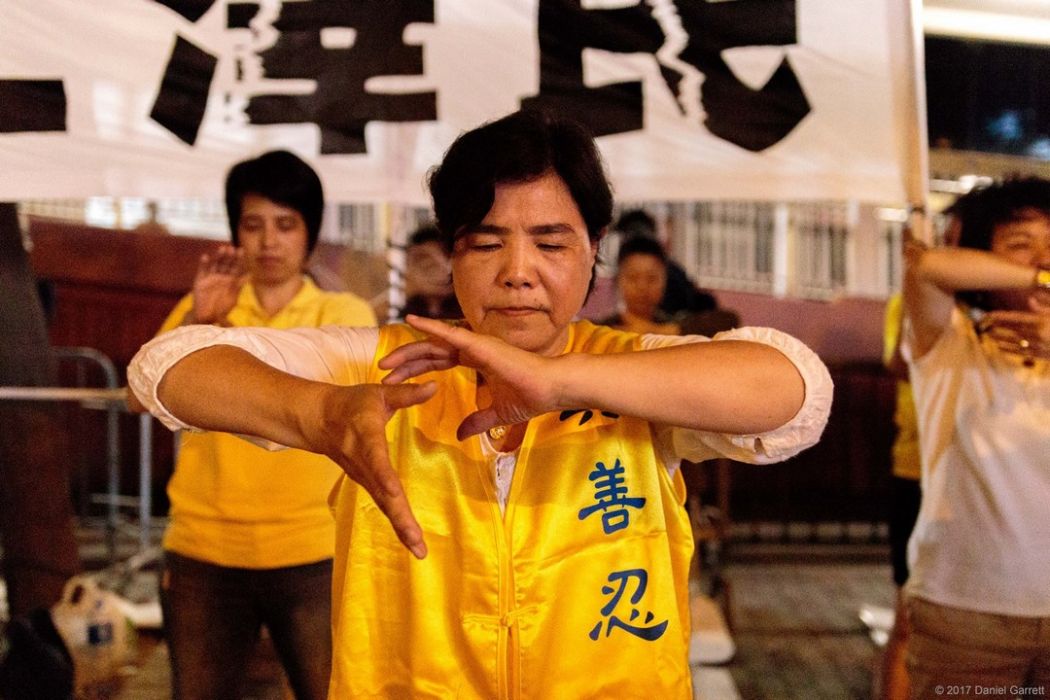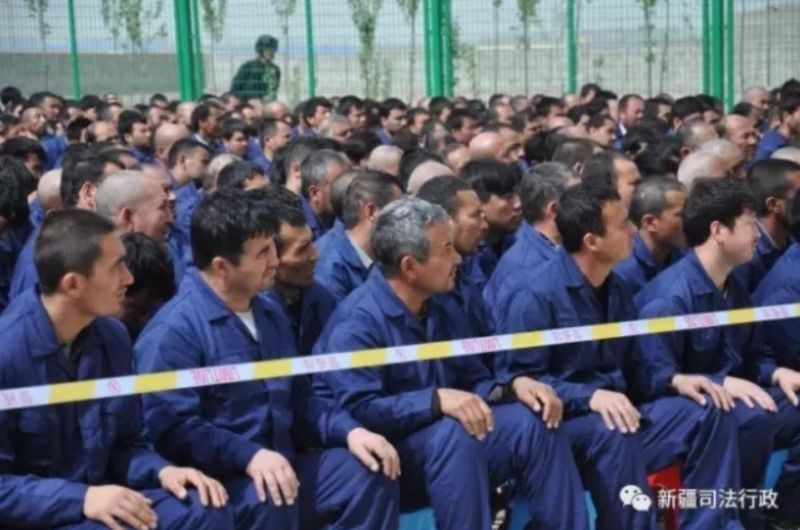by Sarah Cook, Freedom House
As the Chinese Communist Party (CCP) moves forward with plans for a “social credit system” that would rate and impose consequences for citizens’ behaviour, much reporting and commentary has focused on how such systems could undermine privacy, blacklist undeserving victims, and penalise the party’s critics.

But there is an even more disturbing dimension to the social credit phenomenon: The ways in which it may incentivise citizens to act as enforcers for the authoritarian party-state and help to repress their own compatriots. While the nationwide system is not yet in place, examples of similar incentives can be found in a variety of existing CCP policies and practices.
Propaganda prizes
One party-backed reward system that made headlines this month is a new mobile phone application meant to promote “Xi Jinping Thought” and other propaganda: “Study Xi, Strengthen China” (Xué Xí Qiáng Guó). Along with a steady stream of Xi quotes and state media reports, the app—which has already been downloaded tens of millions of times—incorporates quizzes and other opportunities for users to earn “Xi study points” that can be cashed in for real-world prizes. Importantly, one accumulates points not only for consuming information, but also for sharing articles with friends.
This is not the only example of such digital incentives, nor are they limited to users inside China. An app offered by the English-language state newspaper China Daily via Apple’s US-based iTunes store also offers users points for reading, liking, and sharing articles, and the points can be converted into virtual coins and used to make purchases from an online store.

At first glance, such user engagement may seem relatively harmless. But sharing Chinese state media content can mean promoting the coerced confessions of lawyers and journalists, or the whitewashing of mass detention policies in Xinjiang. Warping the information environment can do real-world damage.
Rewarding acts of repression against minorities
Various pilot schemes and disparate systems related to the development of a national social credit mechanism include elements that effectively encourage the repression of religious and ethnic minorities. For instance, an investigation by Nectar Gan published in the South China Morning Post on February 19 details how information is collected and points are allotted in the city of Rongcheng in Shandong Province. In one case, 10 points were granted to a couple “who have a son serving in the army in Tibet,” where Chinese security forces enforce onerous constraints on the fundamental rights of ethnic Tibetans.
In another example from the same town, as reported by Foreign Policy in April 2018, those who receive a “city-level award” can earn 30 points. While the article states that such awards can be gained “for committing a heroic act,” they have also been offered to officials who loyally repress the rights of local residents. An official 2014 document from Hefei in Anhui Province, for instance, states that street-level officials were granted an award established by the city because of the effectiveness of their efforts to force local Falun Gong practitioners to “transform,” a euphemism for coercing people to renounce their beliefs, typically with the use of physical and psychological violence.

In Rongcheng, material rewards for high scores include the ability to rent bikes without a deposit, discounts on heating, and eligibility for bank loans. But incentives also exist outside of the nascent social credit system. A comprehensive 2017 Freedom House study on religion in China found that across various faiths, “monetary incentives play a direct role in the enforcement of restrictions on religious practice,” and that “within the party-state system, promotions and bonuses are available to officers who effectively crack down on targeted religious groups and behaviours.”
Expanding party evaluation schemes to the general public
In many ways, Beijing’s social credit plans are a digitised and expanded version of the elaborate performance evaluation system that has shaped the careers of government officials and party cadres throughout the post-Mao era.
That system’s scoring tables and prioritised target categories play a crucial role in encouraging violations of human rights. For instance, one 2002 scoring table from Guangzhou, issued by the notorious 610 Office, a party-based security force leading the anti–Falun Gong campaign, provides the criteria for assessing each township and neighbourhood in Tianhe District. It lists 28 indicators for point reductions, including failure to “formulate a reeducation program” or “establish a personal dossier” on local residents known to practice Falun Gong. The scorecard also lists three indicators for point gains, including five points for every local adherent successfully “transformed” and for each time an arrest prevented the dissemination of information sympathetic to Falun Gong.

With regard to target categories, the highest level are the “priority targets with veto power” (yipiao foujue, literally “one-ticket veto”). Failure on one such indicator automatically cancels out positive performance in other areas and can by itself result in a cadre being terminated or passed over for promotion. Based on a Freedom House examination in early 2014 of provincial and city-level documents, the main “veto power” areas designated by the central authorities under Xi Jinping’s leadership at the time were social stability management, population and family planning, and party discipline.
The influence of these evaluation practices on the planned social credit system is clear. Most accounts of pilot programs indicate the existence of scoring tables that include both demerits and rewards. Moreover, party standards and evaluation terminology have begun to appear in regulations governing social credit scores. A set of April 2018 guidelines from the Ministry of Finance relating to accountants, published on the Credit China website on February 20, 2019, lists Xi Jinping Thought as the ideology guiding the system. It also instructs implementation of a “one-ticket veto system” (yipiao foujue zhi) for untrustworthy accountants, while calling for the creation of a unified national credit information platform for the accounting profession.
Given these connections, it seems reasonable to expect that accountants could be punished not just for engaging in fraud or dishonesty, but also for practicing a persecuted religion, calling on officials to declare their assets, mocking the Communist Party in an online post, or petitioning higher authorities over a grievance.
Peer informants
Some existing incentive systems are quite explicit about encouraging private citizens to inform on one another.

In Xinjiang, monetary rewards are routinely offered to those who provide information to authorities about Uighurs’ religious practices. An April 2014 notice posted on a government website in Aksu Prefecture explained that informants could receive up to 50,000 yuan ($8,000) for reporting on local residents who engage in any of 53 kinds of proscribed behaviour. The list included 18 acts related to religion, such as praying in a public place, holding the Islamic Nikah wedding ceremony, or fasting during Ramadan. In Tibet, officials have offered monetary rewards of up to 200,000 yuan ($31,500) for information on monks associated with a self-immolation or other acts of dissent.
In 2012, the Sina Weibo microblogging platform introduced its own credit system, initially Dubbed “Weibo Credit” and then replaced by “Sunshine Credit in 2016. One feature of the schemes is for users to report one another for activities ranging from harassment to the spreading of “untrue information.” Each negative report results in a lower score that can lead to a “low-credit user” badge or even the deletion of one’s account. A year after implementing the Weibo Credit system, Sina reported that more than 15 million reports of harmful information had been received; many were related to spam, but at least some likely involved politically sensitive posts. In October 2017, some users complained that the credit system was being abused to delete photos of women showing bare skin, even those that were clearly not pornographic. As one user explained it, “The reason why so many posts are reported is that each supervisor has been given a specific quota every month. They have to file at least 200 reports in exchange for the RMB 200 subsidy.”
In a more recent example, a Hebei court released a WeChat “map of deadbeat debtors” on January 14. According to China Daily, “users are given an on-screen radar, which allows them to discover if there is anyone who owes money within a 500-metre radius.” Individuals are then encouraged to tell authorities if they believe the person can afford to pay back what they owe.
Such peer evaluations are being incorporated into some social credit system pilots. In Rongcheng, a team of 10 municipal representatives are tasked with manually taking note of relevant actions and assigning appropriate scores to residents. Similarly, in Qingzhen, a city in Guizhou Province, a list of 1,000 indicators are reportedly used to assign a point value to citizens, including some based on peer evaluations and community monitoring.

The combination of material rewards and repressive goals is likely to intensify the pressure on local administrators and ordinary citizens to report peaceful but nonconformist behaviour by their neighbours. Last month, a petitioner from Rongcheng was docked 950 credit points after sending more than 1,000 online appeal letters related to a two-decade-old medical dispute involving his mother. Members of one residential community in the city face added penalties in their score assessments for illegally spreading religion.
It is also easy to see how people could be tempted to make false reports, perhaps as an act of personal revenge over some unrelated grudge. Ironically, it is these kinds of practices—reminiscent of the Cultural Revolution—that have so thoroughly undermined societal trust in China, the very problem that the social credit systems are presumably aimed at addressing.
Official morality versus personal conscience
To properly understand the Chinese government’s various efforts to promote “good” and deter “bad” behaviour, one must place them within the often counterintuitive and inhumane logic of the authoritarian political system. This is a system in which large numbers of people seeking the betterment of their society—by peacefully exposing corrupt officials, revealing rights abuses, investigating health scandals, or defending religious freedom—have been harshly punished and imprisoned. Indeed, one of the central contradictions of the social credit experiment is that many of the most credit-worthy individuals in China (in the Confucian sense of the word) are those most likely to be penalised under the CCP’s distorted incentive system.
As these programs expand, Chinese users may want to think twice about what kinds of actions they are willing to perform in exchange for rewards. They should consider resisting behaviour that violates fellow citizens’ rights or vilifies CCP victims, even if such resistance entails some personal risk. Earning points by doing community service, putting up a basketball hoop at the local playground, or caring for elderly parents can have clear societal benefits. The same cannot be said for informing on a neighbour who fasts during Ramadan, hands out information on the torture of Falun Gong adherents, or shares a joke at Xi Jinping’s expense. A truly moral society calls on its members to exercise their own judgement in distinguishing right from wrong, and to do right regardless of any short-term benefit. Virtue, after all, should be its own reward.
Sarah Cook is a Senior Research Analyst for East Asia at Freedom House and director of its China Media Bulletin.
